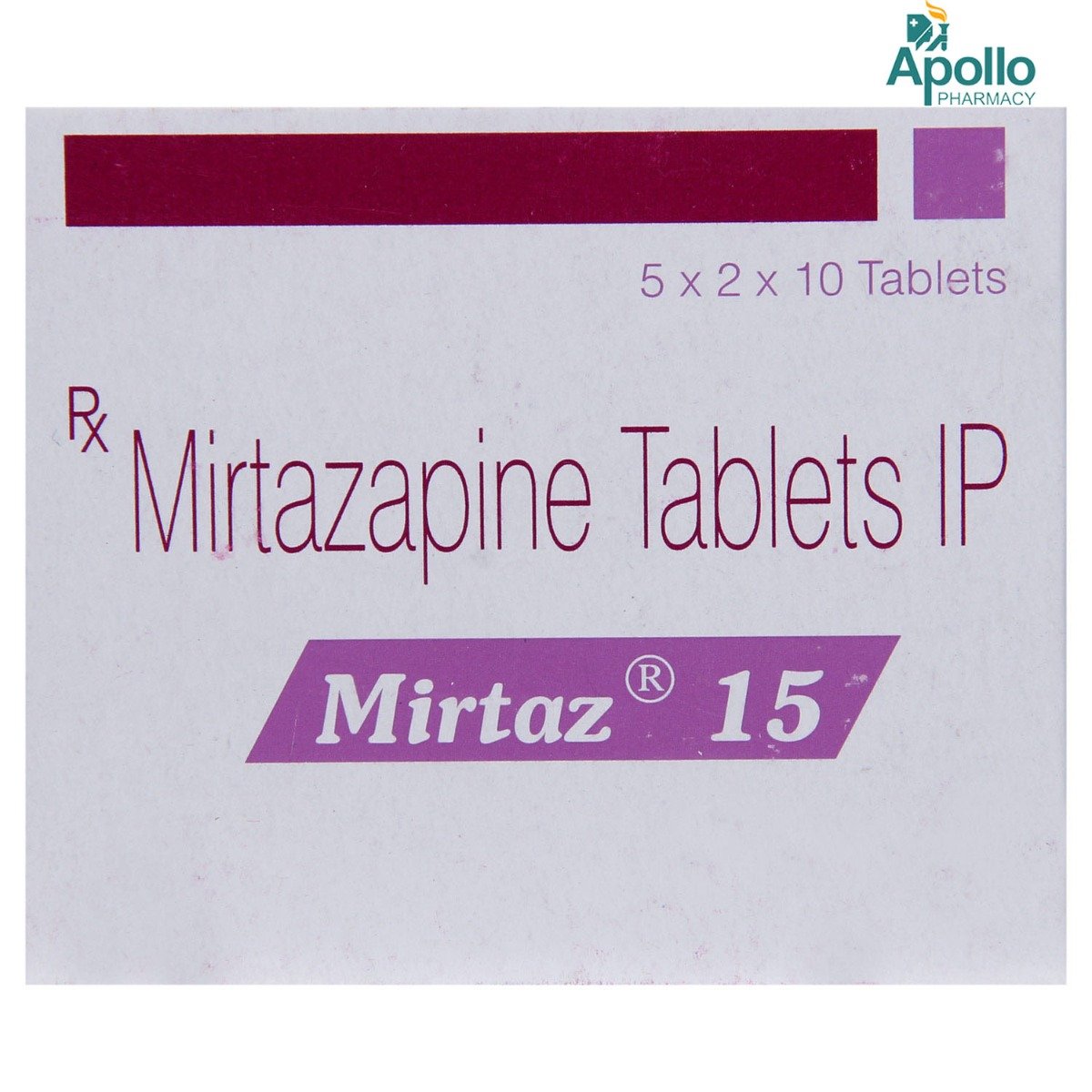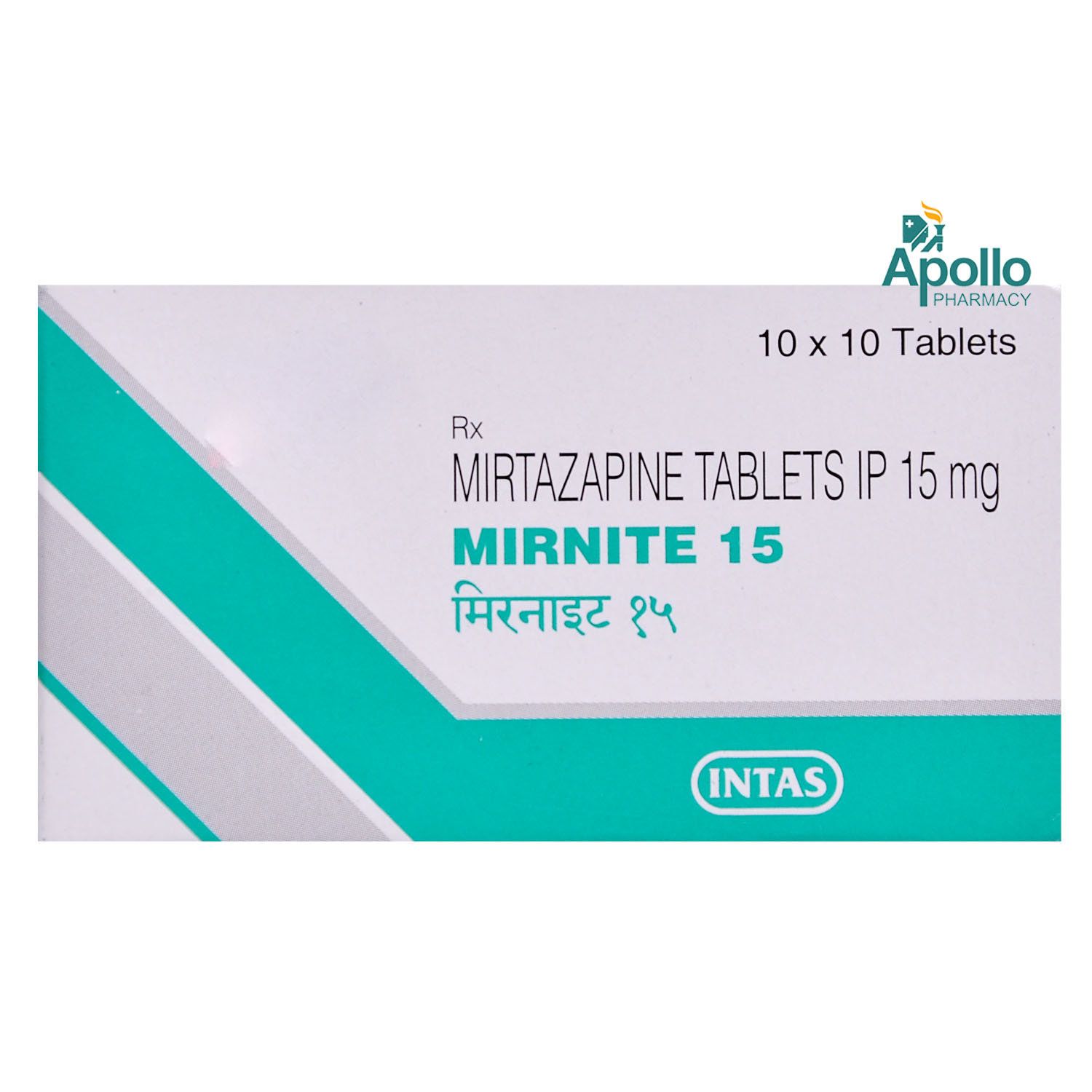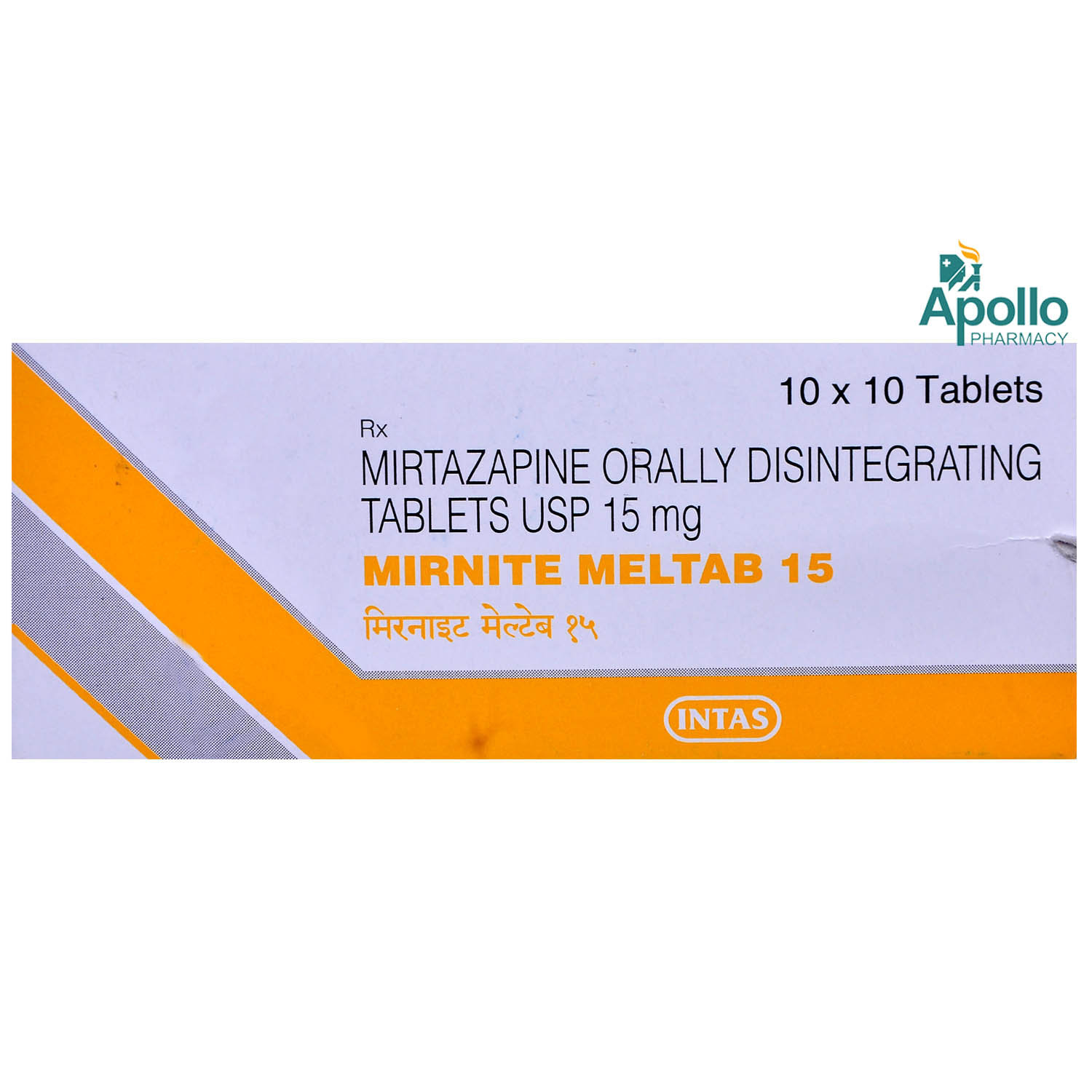Mirfast-15 Tablet 10's
MRP ₹140
(Inclusive of all Taxes)
₹21.0 Cashback (15%)
Provide Delivery Location
Online payment accepted
 Prescription drug
Prescription drugWhats That
Composition :
Manufacturer/Marketer :
Consume Type :
Expires on or after :
Return Policy :
About Mirfast-15 Tablet 10's
Mirfast-15 Tablet 10's belongs to a group of medicines called anti-depressants used to treat the major depressive disorder. Additionally, Mirfast-15 Tablet 10's is sometimes used to treat obsessive-compulsive disorder (OCD), and anxiety disorders. Depression is a mood disorder characterised by sadness, unhappiness, anger, hopelessness or loss that interferes with a person’s daily activities.
Mirfast-15 Tablet 10's contains ‘Mirtazapine’, which increases the activity of mood-enhancing chemical messengers such as serotonin and norepinephrine in the brain, which communicate between brain cells, thereby regulating mood and treats depression.
You are advised to take Mirfast-15 Tablet 10's for as long as your doctor has prescribed it for you, depending on your medical condition and response to the treatment. In some cases, you may experience certain common side-effects such as sleepiness, drowsiness, weight gain, dry mouth, headache, nausea, vomiting, and tiredness. Talk to your doctor if you experience these side-effects persistently.
Please do not stop taking Mirfast-15 Tablet 10's without consulting your doctor, as it could lead to recurring symptoms. Consult your doctor if you are pregnant or breastfeeding. Mirfast-15 Tablet 10's is not recommended for children below 18 years as the safety and effectiveness have not been established. Avoid consuming alcohol along with Mirfast-15 Tablet 10's as it could lead to increased drowsiness and dizziness. Keep your doctor informed about your health condition and medicines to rule out any side-effects.
Uses of Mirfast-15 Tablet 10's
Directions for Use
Key Benefits
Mirfast-15 Tablet 10's belongs to a group of medicines called tetracyclic anti-depressants. Mirfast-15 Tablet 10's is used to treat major depressive disorder. Additionally, Mirfast-15 Tablet 10's is sometimes used to treat obsessive-compulsive disorder (OCD) and anxiety disorders. Mirfast-15 Tablet 10's works by increasing mood-enhancing chemical messengers such as serotonin and norepinephrine in the brain, which communicate between brain cells, thereby regulating mood and treating depression.
Storage
- Eat a balanced diet containing enough proteins, fibre, healthy fats, vegetables and fruits.
- Get quality sleep for about 7-9 hours.
- Try to manage stress with meditation or yoga.
- Drink enough water.
- Exercise regularly as it helps regulate appetite.
- Inform your doctor about dizziness symptoms. They may adjust your medication regimen or prescribe additional medications to manage symptoms.
- Follow your doctor's instructions for taking medication, and take it at the same time every day to minimize dizziness.
- When standing up, do so slowly and carefully to avoid sudden dizziness.
- Avoid making sudden movements, such as turning or bending quickly, which can exacerbate dizziness.
- Drink plenty of water throughout the day to stay hydrated and help alleviate dizziness symptoms.
- If you're feeling dizzy, sit or lie down and rest until the dizziness passes.
- Track when dizziness occurs and any factors that may trigger it, and share this information with your doctor to help manage symptoms.
- Rest well; get enough sleep.
- Eat a balanced diet and drink enough water.
- Manage stress with yoga and meditation.
- Limit alcohol and caffeine.
- Physical activities like walking or jogging might help boost energy and make you feel less tired.
Drug Warnings
Do not take Mirfast-15 Tablet 10's if you are allergic to any of its contents; if you are taking monoamine oxidase inhibitors (MAOI) such as moclobemide, tranylcypromine, selegiline or have taken them in the last 14 days. Inform your doctor if you have/had epilepsy, low blood pressure, urination problems or enlarged prostate, glaucoma, diabetes, schizophrenia, mania, dementia (memory loss), heart, kidney or liver problems. Consult your doctor immediately if you have suicidal thoughts, such as killing or harming yourself. Consult your doctor if you are pregnant or breastfeeding. Mirfast-15 Tablet 10's is not recommended for children below 18 years as safety and effectiveness have not been established. Avoid consuming alcohol along with Mirfast-15 Tablet 10's as it could lead to increased drowsiness and dizziness. Rise slowly from sitting or lying position as Mirfast-15 Tablet 10's may cause dizziness on standing suddenly.
Drug-Drug Interactions
Drug-Drug Interactions
Login/Sign Up
Using Rasagiline together with Mirfast-15 Tablet might raise serotonin hormone levels in the body, affecting the brain and nerve cells. Increased serotonin hormone can lead to severe side effects.
How to manage the interaction:
Taking Mirfast-15 Tablet with rasagiline is not recommended, but can be taken together if prescribed by your doctor. However, if you experience confusion, hallucination(seeing or hearing things that does not exist), seizure, extreme changes in blood pressure, increased heart rate, fever, excessive sweating, shivering or shaking, blurred vision, muscle spasm, stomach cramp, nausea, vomiting, and diarrhea, contact your doctor right away. Do not discontinue any medications without first consulting your doctor.
Using Mirfast-15 Tablet together with Safinamide can increase the risk of serotonin syndrome (A condition resulting from the accumulation of high levels of serotonin in the body. Serotonin is especially a mood stabilizer).
How to manage the interaction:
Although using Safinamide and Mirfast-15 Tablet together may cause an interaction, they can be taken if prescribed by a doctor. Consult a doctor if you have symptoms such as confusion, hallucination, fits, blood pressure alteration, increased heart rate, fever, excessive sweating, shivering or shaking, blurred vision, pain in the muscles or stiffness, incoordination, stomach cramps, nausea, vomiting, and diarrhea. Inform a doctor if you have recently taken amitriptyline. Do not discontinue any medications without consulting a doctor.
Using mesoridazine together with Mirfast-15 Tablet can increase the risk of an irregular heart rhythm.
How to manage the interaction:
Taking Mirfast-15 Tablet with Mesoridazine is not recommended, please consult your doctor before taking it.
Using cisapride together with Mirfast-15 Tablet can increase the risk of an irregular heart rhythm which can be severe. The risk increases in patients with a history of heart illness or electrolyte imbalance.
How to manage the interaction:
Taking Mirfast-15 Tablet with Cisapride is generally not advised as it can possibly result in an interaction, it can be taken if your doctor has advised it. However, if you experience sudden dizziness, lightheadedness, fainting, shortness of breath, chest pain or tightness, rapid heartbeat, or memory loss, contact your doctor immediately. Do not discontinue any medications without consulting a doctor.
Using Linezolid together with Mirfast-15 Tablet might raise serotonin hormone levels in the body, affecting the brain and nerve cells. Increased serotonin hormone can lead to severe side effects.
How to manage the interaction:
Taking Linezolid with Mirfast-15 Tablet can result in an interaction, it can be taken if a doctor has advised it. However, if you experience confusion, hallucination, seizure, extreme changes in blood pressure, increased heart rate, fever, excessive sweating, shivering or shaking, blurred vision, muscle spasm or stiffness, tremor, incoordination, stomach cramp, nausea, vomiting, and diarrhea contact your doctor immediately. Do not discontinue any medications without consulting a doctor.
Using pimozide together with Mirfast-15 Tablet can increase the risk or severity of irregular heart rhythms which can be severe. The risk increases in patients with a history of heart illness or electrolyte imbalance.
How to manage the interaction:
Taking Pimozide with Mirfast-15 Tablet is generally avoided as it can possibly result in an interaction, it can be taken if your doctor has advised it. However, if you experience sudden dizziness, lightheadedness, fainting, shortness of breath, chest pain or tightness, rapid heartbeat, or memory loss, contact your doctor immediately. Do not discontinue any medications without consulting a doctor.
Using Zolmitriptan together with Mirfast-15 Tablet can increase the risk of a rare but serious condition called serotonin syndrome (A condition resulting from the accumulation of high levels of serotonin in the body. Serotonin is especially a mood stabilizer).
How to manage the interaction:
Although there is a possible interaction between Mirfast-15 Tablet and Zolmitriptan, you can take these medicines together if prescribed by your doctor. If you notice any of these signs - like confusion, shaking, or stomach discomfort - it's a good idea to reach out to a doctor right away. Do not stop using any medications without talking to a doctor.
Using Granisetron together with Mirfast-15 Tablet might raise serotonin hormone levels in the body, affecting the brain and nerve cells. Increased serotonin hormone can lead to severe side effects.
How to manage the interaction:
Although there is a possible interaction between granisetron and Mirfast-15 Tablet, you can take these medicines together if prescribed by a doctor. However, if you notice any of the following symptoms - confusion, hallucination, seizure, increased heart rate, fever, excessive sweating, blurred vision, muscle spasm, stomach cramp, nausea, vomiting, diarrhea, dizziness, lightheadedness, fainting, shortness of breath, or heart palpitations it is recommended to contact a doctor immediately. Do not discontinue any medications without consulting a doctor.
Using vandetanib together with Mirfast-15 Tablet can increase the risk of an irregular heart rhythm. The risk increases in patients with a history of heart illness or electrolyte imbalance.
How to manage the interaction:
Taking Mirfast-15 Tablet with Vandetanib together can possibly result in an interaction, but it can be taken if your doctor has advised it. If you have any of these symptoms like diarrhea or vomiting, sudden dizziness, feeling lightheaded or fainting, difficulty breathing, or heart palpitations, it's important to contact a doctor right away. Do not stop using any medications without a doctor's advice.
Using Citalopram together with Mirfast-15 Tablet might raise serotonin hormone levels in the body, affecting the brain and nerve cells. Increased serotonin hormone can lead to severe side effects.
How to manage the interaction:
Although taking Mirfast-15 Tablet and Citalopram together can cause an interaction, it can be taken if your doctor has suggested it. If you experience any of the following symptoms like confusion, hallucination, seizure, increased heart rate, fever, excessive sweating, shivering, shaking, blurred vision, muscle spasm, stiffness, incoordination, stomach cramps, nausea, vomiting, or diarrhea it is recommended to contact a doctor right away. Do not stop using any medications without a doctor's advice.
Drug-Food Interactions
Drug-Food Interactions
Login/Sign Up
Diet & Lifestyle Advise
- Maintain a healthy diet and exercise regularly as it helps in improving overall health and boosts self-esteem.
- Regularly attend therapy sessions.
- Perform meditation and yoga. This helps in relieving stress and provides relaxation.
- Follow a regular sleep pattern to improve the amount and quality of sleep you get.
- Include foods rich in omega-fatty acids such as fish, nuts, fresh fruits, vegetables and olive oils.
- Neurotransmitters are made up of amino acids. Amino acid-rich foods such as meat, dairy products, and certain fruits and vegetables help in the proper maintenance of neurotransmitters.
- Complex carbohydrates help in stimulating serotonin (a feel-good neurotransmitter). These include whole grains, legumes, spinach, broccoli, oranges and pears.
- Exercising helps in the production of the body’s natural anti-depressants. It also helps in relieving stress, improving mood, boosting self-esteem, and providing restful sleep.
- Avoid smoking and alcohol consumption.
- Learn about your condition, understand the risk factors and follow the doctor’s treatment plan.
Side Effects of Mirfast-15 Tablet 10's
- Sleepiness
- Drowsiness
- Weight gain
- Dry mouth
- Headache
- Nausea
- Vomiting
- Tiredness
Habit Forming
Therapeutic Class
All Substitutes & Brand Comparisons
RX
Out of StockNot for online saleDeples 15 Mouth Dissolving Tablet 10's
Lifecare Neuro Products Ltd
₹76
(₹7.6 per unit)
39% CHEAPERRX
Out of StockNot for online saleMIRTADEP 15MG TABLET
Unichem International
₹90.4
(₹7.96 per unit)
36% CHEAPERRX
Out of StockNot for online saleMIRAZEP 15MG TABLET
Micro Labs Ltd
₹90
(₹8.1 per unit)
35% CHEAPER
Author Details
We provide you with authentic, trustworthy and relevant information
Drug-Diseases Interactions
Drug-Diseases Interactions
Login/Sign Up
FAQs
Drug-Drug Interactions Checker List
- TRANYLCYPROMINE
- SELEGILINE
- NEFAZODONE
- DULOXETINE
- SERTRALINE
- ESCITALOPRAM
- ERYTHROMYCIN
- LINEZOLID
- KETOCONAZOLE
- RIFAMPICIN
- OLANZAPINE
- ARIPIPRAZOLE
- QUETIAPINE
- CARBAMAZEPINE
- PHENYTOIN
- PREGABALIN
- TRAMADOL
- MORPHINE
- ACETAMINOPHEN
- HYDROCODONE
- CETIRIZINE
- CIMETIDINE
- WARFARIN
- ALPRAZOLAM
- METOPROLOL
- MOCLOBEMIDE
Special Advise
- Your doctor may suggest regular cardiac check up as Mirfast-15 Tablet 10's may cause a condition that affects the heart rhythm (QT prolongation).
- Regularly monitor blood sugar levels as Mirfast-15 Tablet 10's may cause fluctuation in blood glucose level.
- You should not discontinue Mirfast-15 Tablet 10's abruptly; your doctor will reduce the dose slowly over a few weeks.
Disease/Condition Glossary
Major depressive disorder: Major depressive disorder, also known as clinical depression, is a mental health disorder characterised by a persistent and intense feeling of sadness for an extended duration of time. It mainly impacts mood, behaviour, and other physical functions, such as sleep and appetite. Symptoms include sadness, loss of interest, appetite changes, sleep problems, restlessness, lack of energy, feeling worthless or guilty, thoughts of harming oneself, difficulty concentrating, making decisions, and thinking. The exact cause of depression is unknown. However, factors such as stress, changes in hormone levels, alcohol or drug abuse, abuse during childhood, certain medical conditions and medications might increase the risk of developing depression.

Have a query?
Alcohol
Safe if prescribed
Avoid consumption of alcohol while taking Mirfast-15 Tablet 10's as it may cause an increased sedative effect.
Pregnancy
Consult your doctor
Mirfast-15 Tablet 10's belongs to pregnancy category C. Please consult your doctor if you have any concerns regarding this, your doctor will prescribe only if the benefits outweigh the risks.
Breast Feeding
Consult your doctor
Mirfast-15 Tablet 10's may pass into breastmilk. Consult your doctor before taking Mirfast-15 Tablet 10's, your doctor will decide whether Mirfast-15 Tablet 10's can be taken by breastfeeding mothers or not.
Driving
Safe if prescribed
Mirfast-15 Tablet 10's may cause sleepiness, dizziness and drowsiness. Do not drive or operate machinery if you experience these symptoms.
Liver
Consult your doctor
Dose adjustment may be needed in patients with liver impairment. Please consult your doctor if you have a liver impairment or any concerns regarding this.
Kidney
Consult your doctor
Dose adjustment may be needed in patients with kidney impairment. Please consult your doctor if you have kidney impairment or any concerns regarding this.
Children
Safe if prescribed
Mirfast-15 Tablet 10's is not recommended for children below 18years as the safety and effectiveness have not been established.











_0.jpg?tr=q-85)

